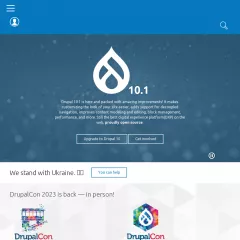
Drupal is a free and open-source content management system (CMS) written in PHP. It is known for its flexibility, scalability, and extensive module ecosystem, making it a powerful platform for building and managing various types of websites and web applications. Drupal is developed and maintained by a community of contributors worldwide.
Here are some key features and aspects of Drupal:
Content Management: Drupal provides a robust content management system, allowing users to create, edit, organize, and publish different types of content. It supports various content types, including articles, blog posts, pages, media, and custom content types. Drupal offers flexible content modeling, allowing users to define custom fields, taxonomies, and relationships between content entities.
Modular Architecture: Drupal follows a modular architecture, enabling users to extend its functionality by adding or enabling modules. There is a vast collection of contributed modules available in the Drupal community, covering a wide range of features and functionalities. Modules can be used to add e-commerce capabilities, enhance SEO, integrate with third-party services, implement advanced workflows, and much more.
Customization and Theming: Drupal allows users to customize the appearance and behavior of their websites through themes. Themes control the visual presentation of the site, including layouts, styling, and templates. Drupal offers a flexible theming system, allowing developers to create custom themes or modify existing ones to match specific design requirements.
User Roles and Permissions: Drupal provides a robust user management system, allowing administrators to create multiple user accounts with different roles and permissions. User roles can be defined to control access levels, content creation and editing privileges, administrative tasks, and more. This feature enables collaboration and control over website content and administration.
Community and Contributed Modules: Drupal has a vibrant and active community of developers and users who contribute to its development, create modules, and provide support. The Drupal community actively maintains a repository of contributed modules and themes, which extends the core functionality of Drupal and offers additional features and integration options.
Multilingual Support: Drupal has built-in multilingual capabilities, enabling the creation of websites in multiple languages. It supports the translation of content, interface localization, and language-based site customization. Drupal's multilingual features make it suitable for building websites that target global audiences.
Scalability and Performance: Drupal is designed to handle high-traffic websites and applications. It offers caching mechanisms, database optimization techniques, and performance tuning options to ensure efficient operation even under heavy loads. Drupal's scalability and performance features make it suitable for large-scale projects and websites with high demands.
Security: Drupal has a strong focus on security and has a dedicated security team that actively monitors vulnerabilities and releases security updates. The Drupal security team works closely with the community to address and mitigate security risks promptly.
Drupal is used for a wide range of websites, including corporate websites, government portals, educational institutions, non-profit organizations, e-commerce platforms, and community-driven websites. Its flexibility, extensibility, and active community support make it a popular choice for individuals and organizations looking for a powerful and customizable CMS.
Here are some key features and aspects of Drupal:
Content Management: Drupal provides a robust content management system, allowing users to create, edit, organize, and publish different types of content. It supports various content types, including articles, blog posts, pages, media, and custom content types. Drupal offers flexible content modeling, allowing users to define custom fields, taxonomies, and relationships between content entities.
Modular Architecture: Drupal follows a modular architecture, enabling users to extend its functionality by adding or enabling modules. There is a vast collection of contributed modules available in the Drupal community, covering a wide range of features and functionalities. Modules can be used to add e-commerce capabilities, enhance SEO, integrate with third-party services, implement advanced workflows, and much more.
Customization and Theming: Drupal allows users to customize the appearance and behavior of their websites through themes. Themes control the visual presentation of the site, including layouts, styling, and templates. Drupal offers a flexible theming system, allowing developers to create custom themes or modify existing ones to match specific design requirements.
User Roles and Permissions: Drupal provides a robust user management system, allowing administrators to create multiple user accounts with different roles and permissions. User roles can be defined to control access levels, content creation and editing privileges, administrative tasks, and more. This feature enables collaboration and control over website content and administration.
Community and Contributed Modules: Drupal has a vibrant and active community of developers and users who contribute to its development, create modules, and provide support. The Drupal community actively maintains a repository of contributed modules and themes, which extends the core functionality of Drupal and offers additional features and integration options.
Multilingual Support: Drupal has built-in multilingual capabilities, enabling the creation of websites in multiple languages. It supports the translation of content, interface localization, and language-based site customization. Drupal's multilingual features make it suitable for building websites that target global audiences.
Scalability and Performance: Drupal is designed to handle high-traffic websites and applications. It offers caching mechanisms, database optimization techniques, and performance tuning options to ensure efficient operation even under heavy loads. Drupal's scalability and performance features make it suitable for large-scale projects and websites with high demands.
Security: Drupal has a strong focus on security and has a dedicated security team that actively monitors vulnerabilities and releases security updates. The Drupal security team works closely with the community to address and mitigate security risks promptly.
Drupal is used for a wide range of websites, including corporate websites, government portals, educational institutions, non-profit organizations, e-commerce platforms, and community-driven websites. Its flexibility, extensibility, and active community support make it a popular choice for individuals and organizations looking for a powerful and customizable CMS.